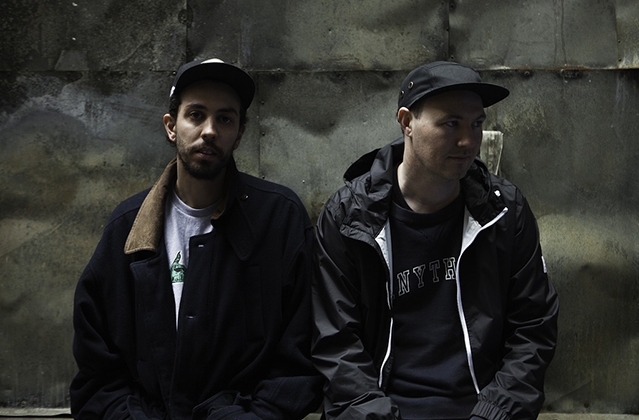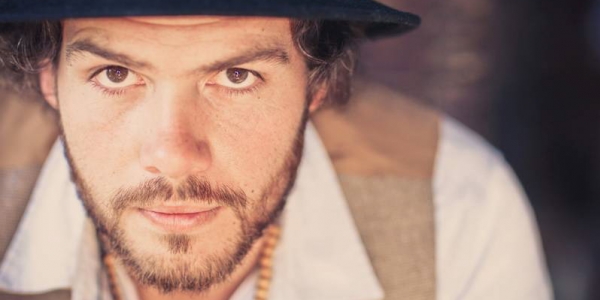“There’s a lot going on so it can feel competitive at times,” he says. “It just helps the scene kind of thrive a bit more when everyone’s doing well. Maybe it is competitive, but it’s a healthy competition, not a nasty one.”
It’s been just over a year since the public first caught wind of Milwaukee Banks, but Rafter and his counterpart, vocalist Dyl Thomas, have both been active in the local scene for years.
“I have been DJing and playing music around Melbourne since the early 2000s,” Rafter says. “Probably so has Dylan. About 2007 or so – that’s when I started really making beats and doing all that sort of work.”
In recent years, Rafter’s major focus has been on low-key electronic productions, released under the Flight Tonight moniker, while Thomas fronted the now-defunct hip hop outfit Polo Club. Having been friends for years, the pair were naturally inclined towards some studio-based experimenting.
“He just wanted some beats to rap on,” Rafter says. “So it was just me sending him beats until he started sending me stuff back that was good [and] I thought ‘maybe we should look into releasing this.’ It wasn’t actually two guys that sat down and said ‘I’m going to write the beats, you’re going to do the raps and we’re going to make this thing a hit’.”
It mightn’t have been their founding motive, but upon releasing debut single Pluto Bounce twelve months ago, Milwaukee Banks quickly became a buzz topic. When the pair’s debut EP Rose Water was officially released in June, that initial buzz blossomed into widespread acclaim. Their drugged-out, downbeat hip hop didn’t just catch the attention of radio listeners and bloggers either. In fact, if the forthcoming Rose Water Remixes EP is anything to by, Milwaukee Banks made an immediate impression on many of their hip-hop and electronic contemporaries.
“After [Rose Water] came out there was a little bit of interest from some friends to do remixes,” Rafter explains. “So we just talked about it and thought, ‘instead of just having one, why don’t we try to get every track remixed?’ and reach out to different people whose work we were admiring.”
Set for release on October 30, the EP features reworked versions of five tracks from Rose Water. Four of the remixes come from Melbourne artists: Andrei Eremin, Lucianblomkamp, RaRa and Friendships. Permitting other musicians to redesign your laboriously constructed compositions is a novel way to collaborate, but there’s also a risk that your precious work will be defaced. No such dramas for Milwaukee Banks.
“I’ve actually enjoyed the remix experience,” Rafter says. “For me one of the really fun parts about writing beats and writing tunes is when you finish something and you hear it and it just sounds amazing, you’re like ‘Wow, we actually finished something’. It has that same sort of feeling with the remixing. Maybe you’re a little bit scared to send stuff off, but then somebody submits their remix and it’s like ‘Wow!’
“We were pretty lucky with the response we got from some of the artists that we reached out to,” he adds. “Like Friendships – we were big fans of some of the stuff Nic [Brown] has been doing so we were really thrilled that he wanted to do a remix. And we were really happy with how it turned out.”
Rafter and Thomas are so pleased with the outcome of the remix EP that they’ll continue to involve their peers in the Milwaukee Banks project. Rafter reveals that they’re already working on new material, this time with some fellow trendsetters in tow.
“We’re trying to push that whole concept a little bit further – of not having those defined roles and ‘let’s try working on other people’s beats’. So we’ve done some work recently with Rat & Co and Andrei Eremin – writing some new original material but with other people.”
Milwaukee Banks are clearly taking advantage of being surrounded by swarms of cunning musicians. However, track four on Rose Water, Patty Mills suggests their experiences in the local music haven’t been completely pain free. It’s a tale of working hard at what you love, but not receiving ample respect. In the song’s second verse, Thomas takes aim at dodgy gig promoters, spitting the line, “Always lying about the numbers, we counted fucking hundreds/ Got no drink card to perform and no names on the door/ What you mean that’s fair deal?”
The circumstances that prompted this particular outburst might be unknown, but the scenario described is something musicians everywhere can no doubt relate to. Despite Thomas’ evident bitterness, Rafter clarifies that it’s not a summary of their experiences in the Melbourne music scene.
“I reckon Melbourne’s got a really vibrant music scene. I think that it’s been a really accommodating experience.”
BY AUGUSTUS WELBY

